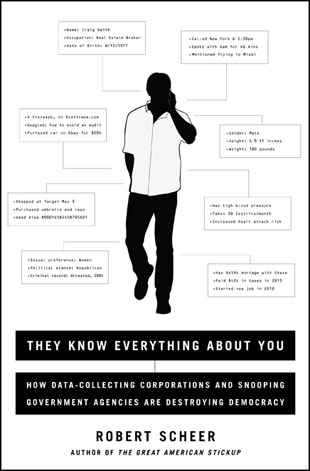"It wasn't until the first week of June 2013, however, that the nation's media finally caught up with the news that for a decade Americans had abjectly surrendered their historic respect for individual privacy to the chimera of national security. That week, the NSA files leaked by Snowden revealed that the federal government has full access to all phone records and to the vast trove of presumably private personal data posted on the Internet.
"The most sacred tenet of American individualism, the right to be left alone, had been squandered, almost without notice. In the wake of the 9/11 attacks, a snooper state had come to be accepted as the norm in which an already robust corporate intrusion into our privacy came to be conjoined with the heightened obsession with security at all costs. A new military-intelligence complex had come into its own based on the unprecedented power of spy agencies, unleashed by the urgency of a so-called War on Terror, fused with the previously unimaginable intrusion into private space wrought by the Internet revolution. The Constitution's Fourth Amendment guarantee of the sovereignty of the individual — 'The right of the people to be secure in their persons, houses, papers, and effects, against unreasonable searches and seizures, shall not be violated' — was being treated as an irrelevant relic of a bygone civilization.
"It was a perfect storm. The snoopers, both state and corporate, now had the capacity for massive storage and search functions, able to move far beyond the level of surveillance ever deemed permissible, or even possible, by the constitutional framers. Now the government, rationalizing the excessive use of state power with a hysterically defended claim that the very existence of our country was threatened by terrorism, merged the private and the public data fields in order to create instant, absurdly detailed portraits of any citizen 'of interest.' One's most intimate habits, from private correspondence, book pages read, and lists of friends and phone conversations, can be seamlessly merged with a detailed map of an individual's DNA, both biological and social.
"The radical transformation of technology today has turned the NSA 'into the virtual landlord of the digital assets of Americans and foreigners alike,' a New York Times editorial aptly stated in response to the disclosures of the monitoring of commercially based data by the nation's most invasive security agency."
